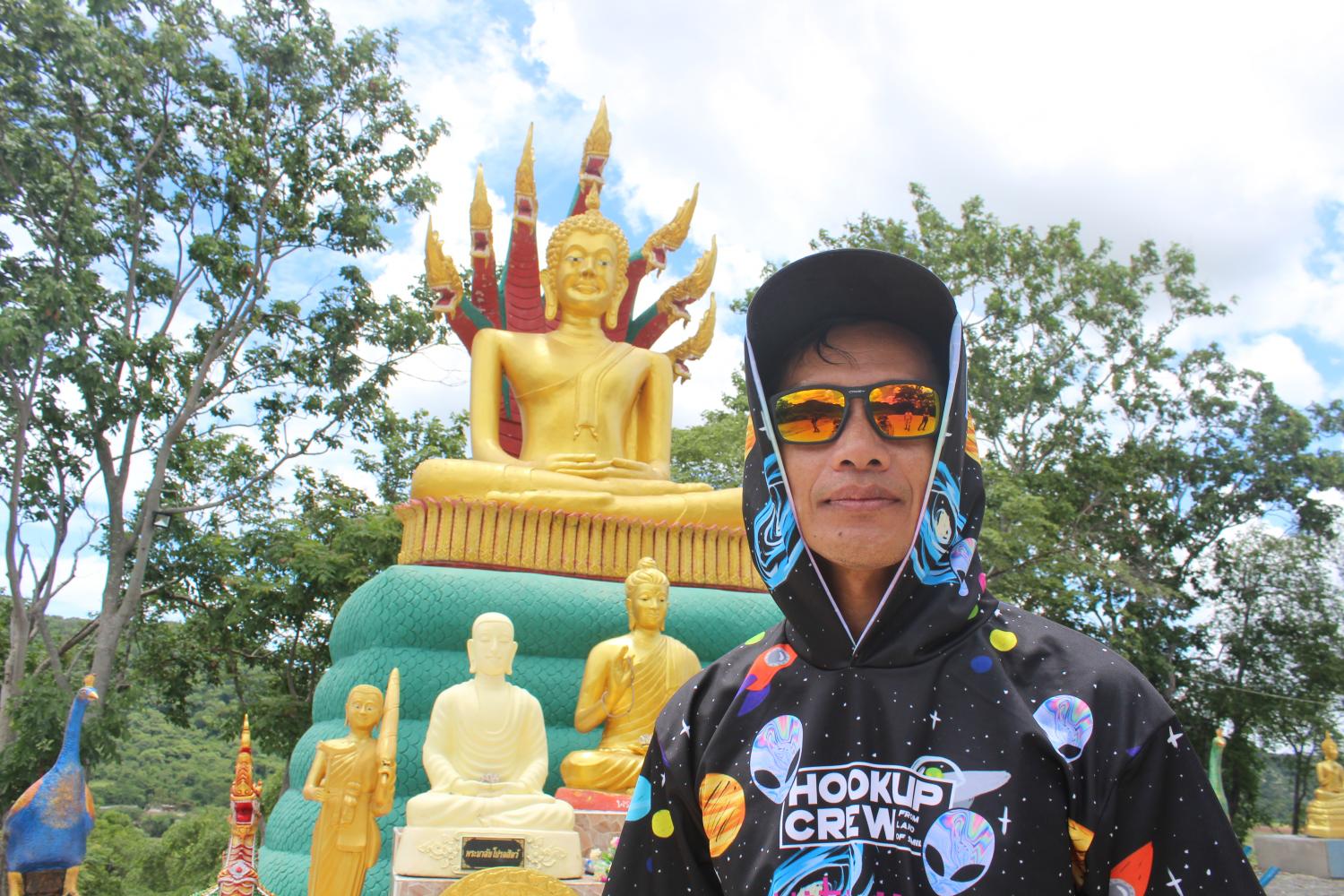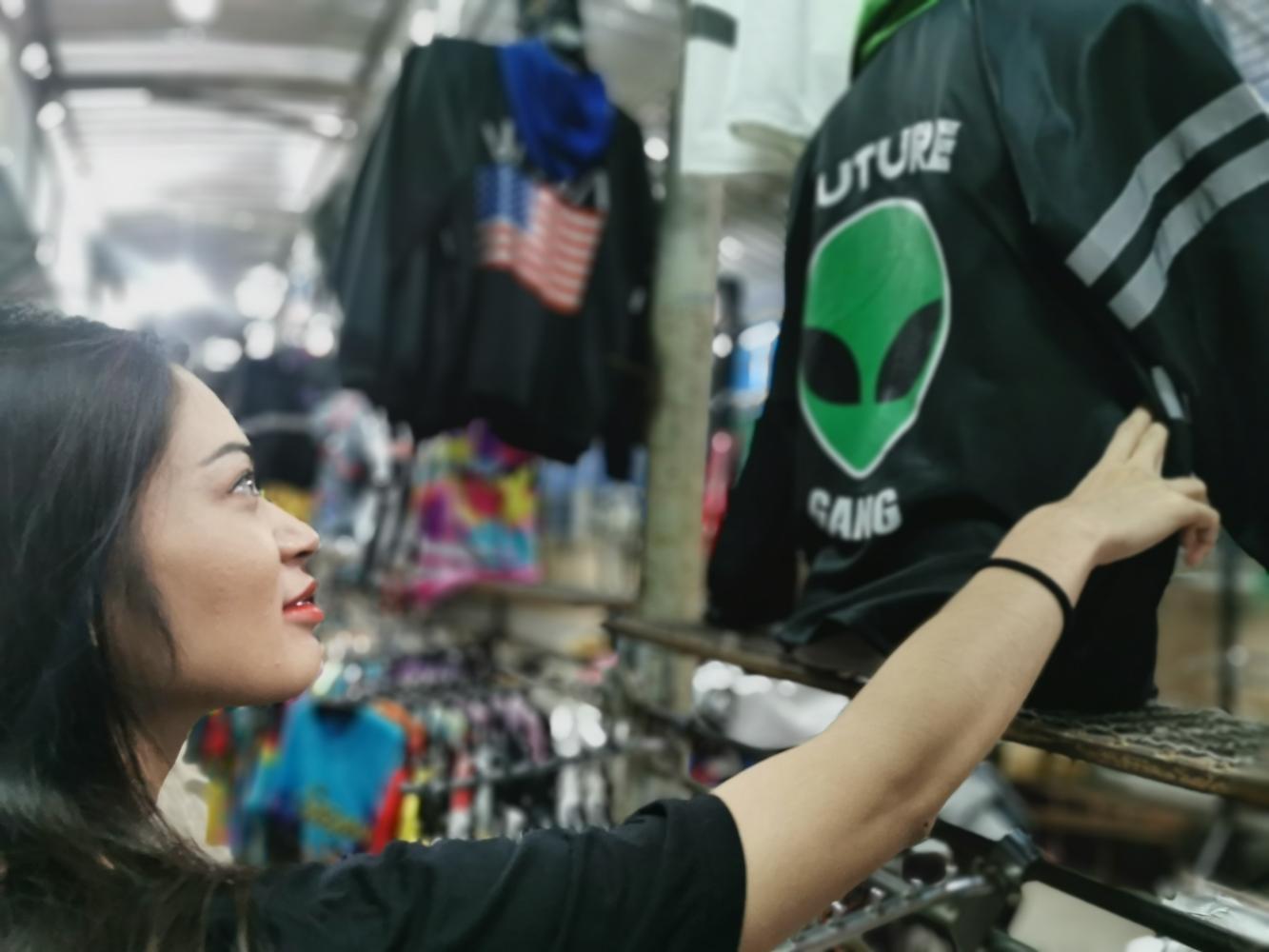
"Could a star do that? Could a plane do that?" asks Ann Thongcharoen, 28, after seeing a light shining through the clouds on top of Khao Kala mountain in Nakhon Sawan province.
"Take a picture of the sky. Zoom in later," she says.
Ann is a member of UFO Kaokala, a group that meditates beneath a sculpture of a Buddha adorned with a seven-headed snake on Khao Kala mountain in the hopes of receiving messages from aliens on Pluto.
The aliens, they say, are delivering messages to help them save humanity in the event of an impending nuclear disaster, which they say is likely to happen in 2022.
"The first time I saw a UFO, it was at Pantip Plaza, Building 1 in Bangkok," says Ann, who has been a member of UFO Kaokala for nine years. After that sighting, she had to wait longer to receive an appearance at her house -- a sign that the aliens specifically chose her to communicate with.
She and the other UFO Kaokala members believe that there are 5,000 "chosen ones" who the aliens have decided to deliver helpful messages to. The more they meditate and abide by Buddhist principles, the more likely they are to receive a visitation.
"I needed to wait for eight years before a spacecraft showed up to me personally at my home," says Ann.

Members of UFO Kaokala meditate in the hope of contacting aliens below a seven-headed snake sculpture on top of Khao Kala mountain.
The people

Members of UFO Kaokala meditate in the hope of contacting aliens below a seven-headed snake sculpture on top of Khao Kala mountain.
While the stereotype of a UFO believer might be the image of a paranoid conspiracy theorist wearing a tinfoil hat, the members of UFO Kaokala are, for the most part, educated professionals. Their group members include graphic designers, lawyers, consultants and public workers.
They say that the group consists of 50 core members, most of whom make the three-hour trip from Bangkok and don't actually live in Nakhon Sawan. But since UFO Kaokala's inception in 1998, they say that over 1,000 people, including visitors from the United States and other countries, have participated in events they've held.
In addition to receiving messages from aliens, some of the members also claim to have additional powers like reading karma and healing sickness.
Ukrin Thaonaknathiphithak, 50, a restaurant worker and a 14-year veteran of UFO Kaokala, started dreaming about UFOs when he was 12 years old. He then started to receive extraterrestrial messages, which he says gave him energy to use his hands to heal people around him from sickness.
Soon after he started going to Khao Kala, he says he spotted 17 spacecraft at one time. He felt strong thought waves going through his head, urging him to look at the sky.
"I felt those [thought waves] too at my home," says Ann, who works at her family's dessert shop in Bangkok when she isn't in Nakhon Sawan.
"I felt the thought wave coming to my head. It told me to sit down and look up at the sky. That kind of thought wave is from alien technology or something like that, but it's not me."
The group was started after founding member Somjit Raepeth, 60, received a telephone call from her father, Cherd Chuensamnuan, asking if aliens exist.
"My father received the energy first and then sent that energy through me," says Ms Somjit. "It's similar to the way we use a cellphone." She says the energy from Pluto forced her to speak a warning of the looming disaster. After that, she became a believer.
Her sister, Wassana Chansamnuan, 47, became a believer shortly after. At the age of 25, in 1998, she received a message from the aliens that they had chosen Khao Kala mountain as a place to communicate with people. Thus, UFO Kaokala, also known by its longer name, the Kaokala Coordination for Disasters Warning Group, was formed.
 The place
The place

Driving up to Khao Kala where the flatland meets the hills, the clouds hang low to the ground -- you might get the sensation that you're closer to the sky than you were in the city. Sugarcane fields and palm trees line the road leading up to the mountain. At night, pink and green lights flash on and off and a large sign that says "UFO" lets you know that you're approaching.
Evidence of Nakhon Sawan's history with alien lore covers this small city of 114,000 people, that's otherwise known for hosting the origin of the Chao Phraya River: a satellite dish turned upside down in someone's yard to look like a flying saucer; images of Stonehenge decorating a hotel lobby; a small model of Stonehenge at a gas station; alien and space-themed gear sold at the night market. There's even a large bridge that cost millions of baht to construct, that looks unusually like the kind of alien spacecraft often depicted in films.
Chaleow Puucharoen, head of the Khao Kala tambon administration organisation, was quoted in local media as saying most people in the area don't believe in aliens and haven't seen aliens or their spaceships. Those who believe tend to be out-of-towners, he said. "They believe in a god or spirit from Pluto ... but personally speaking, I wasn't able to see a thing. But it's up to people what they believe, you can't criticise."

Ukrin Thaonaknathiphithak stands in front of the sculpture that is the focal point of the meditation centre atop Khao Kala mountain.
The aliens and 'cosmic law'

Ukrin Thaonaknathiphithak stands in front of the sculpture that is the focal point of the meditation centre atop Khao Kala mountain.
"There's a galactic federation," says Ann. "It's like the United Nations on Earth except it's between planets." Their code is 11:17. Thus the time, 11:17 is also sacred. "It's a sign of duty. A sign of contact," she says.
The era after the "big disaster" is also fitted with a limited capacity; only 30% of the world's population will survive.
Their philosophy is so specific that it's even outlined in a 134-page book, written in both Thai and English, titled Messages from Extraterrestrials.
"At the time of crisis, the aliens will choose good people to live in the new age. So people who think about dhamma or cosmic law or Buddha are good universal citizens," says Ann.
These aliens are friendly, they say. Some of them communicate only in the form of energy, but others assume more human-like figures. At roughly one metre and 20 centimetres tall, they are shorter than an average person but resemble people in many ways.
Instead of eating food, they eat capsules. They can communicate with anyone, regardless of their native tongue. Most importantly, they follow a sabai sabai, or relaxed, working style, according to Ms Wassana. When disaster strikes, they don't want humans to stress out, at least not too much.

Ann Thongcharoen, a member of UFO Kaokala, admires an alien-themed sweater at the Nakhon Sawan night market.
The legal saga

Ann Thongcharoen, a member of UFO Kaokala, admires an alien-themed sweater at the Nakhon Sawan night market.
UFO Kaokala hit national headlines last month when police raided Khao Kala mountain over alleged encroachment on protected lands.
"It started from a misunderstanding of the story because now Kaokala is famous and many people around Thailand want to join," says Ann.
The group had scheduled a gathering at the meditation centre for Ms Somjit's birthday, and they were expecting a large crowd to camp out on the mountain.
No other reason was given by authorities for the raid which involved around 40 officers and Forestry Department officials, other than that the group was occupying public land.
If the ruling in the case finds that the meditation centre is, in fact, encroaching on public land, they may have to dismantle the centre, which has been at the top of Khao Kala for over 60 years and was built long before it became known as Thailand's hottest spot for UFO sightings.
But the UFO Kaokala members are relatively relaxed about the whole fiasco, perhaps following the sabai sabai mentality of their extraterrestrial comrades.
"It's just stuff," says Ann. "The aliens will come anyway. We actually think it's a good thing because now the Forestry Department will take care of the land and we won't have to.
"She [Ms Wassana] isn't stressed because it's the aliens' plan," says Ann. "They always inform her about every step of their work.
"People think it's crazy and that we're making the story up to confuse society into believing something unbelievable," she says. "But I can feel that people are more open-minded about aliens now."
The future of the meditation centre atop Khao Kala mountain hangs in the balance, but for now, it's all part of the plan.